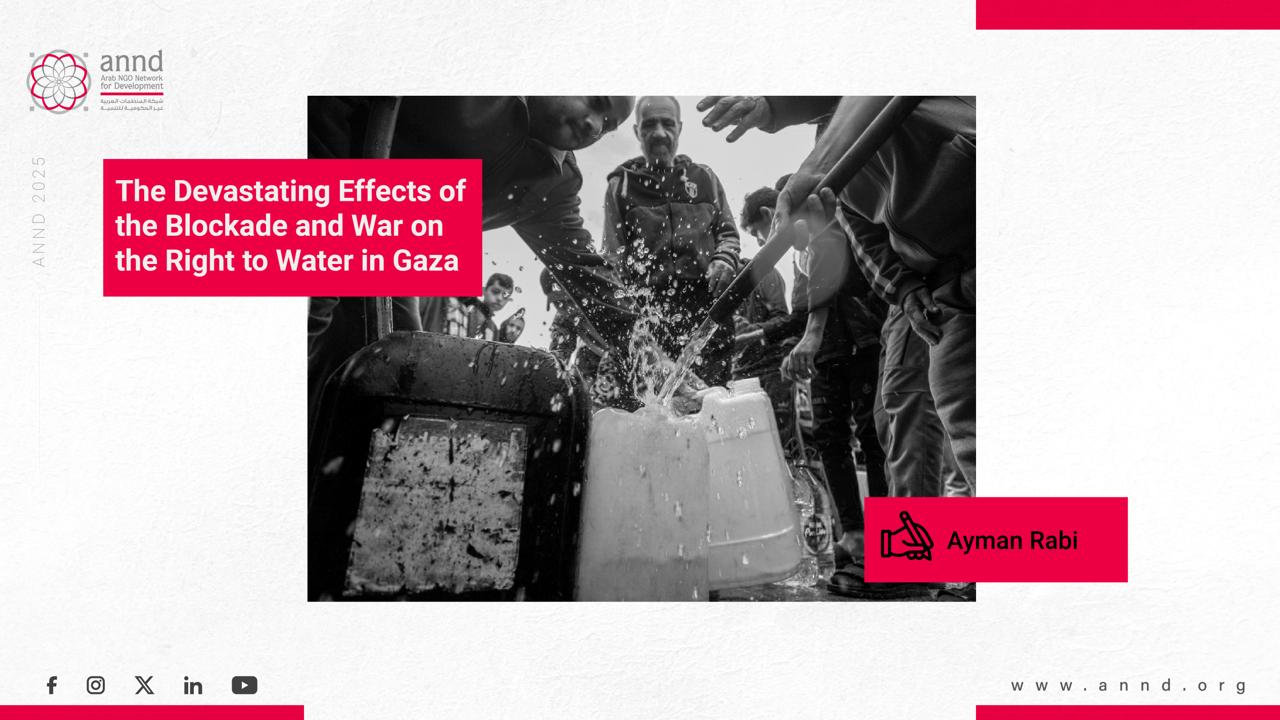
Blockade and War Devastate the Right to Water in Gaza - Ayman Rabi
Blockade and War Devastate the Right to Water in Gaza - Ayman Rabi
The Gaza Strip covers an area of approximately 365 square kilometers and has a population of around 2.2 million. It is considered one of the most densely populated areas in the world, with 5,936 persons per square kilometer. The occupying power has built a separation wall along the Gaza Strip, approximately 65 kilometers long and over 8 meters high. It has imposed a comprehensive blockade on the Gaza Strip since 2007, imposing severe restrictions on the entry of materials necessary to improve services, aspects of life, and infrastructure, including those related to the maintenance and development of water and sanitation systems. Thus, it deprived citizens of their right to water, adequate water and sanitation services, and depriving them of other rights in all aspects of life.
A report by OCHA indicated that the blockade has deprived the sewage systems of their capacity to contain and treat the produced quantities. As a result, approximately 90,000 cubic meters of untreated or partially treated sewage were discharged daily into the sea in 2016 (OCHA, 2016).
In addition, the occupying power has waged six devastating wars and attacks since 2008, the most recent of which has been ongoing since October 8, 2023. All of these attacks have resulted in the loss of thousands of civilian lives, including women and children, massive destruction of residential buildings, water, sanitation, energy, and related infrastructure, and health services. They have also left behind vast amounts of rubble and destruction, severely impacting the environment and all basic services, including sanitation, solid waste, and health services for the residents of the Gaza Strip. They have also polluted land, groundwater, and seawater.
Some reports indicate that the 2021 aggression on the Gaza Strip led to massive environmental pollution, particularly due to solid and hazardous waste, as well as pollution of the beach, land, soil, and air. The amount of debris left behind by this aggression amounted to approximately 275,000 tons. The aggression also caused significant beach pollution, reaching 85%, with approximately 70,000 cubic meters of untreated wastewater being discharged daily onto the beach during 2021, according to the Palestinian Information Center (PIC), 2021.
A 2017 IMF report indicated that the attacks launched by the occupying state on Gaza between 2008 and 2014 destroyed approximately 94% of Gaza's total capital. The cost of these attacks on Gaza during the same period was at least three times Gaza's GDP (IMF, 2017). Nevertheless, the current war waged by the occupying state on the Gaza Strip is the most violent, resulting in more than 56,000 deaths and more than 130,000 civilian injuries, especially women and children.
More than 90% of residential buildings and most public buildings and educational institutions have been destroyed, including 60 Palestinian university buildings; 53% of hospitals have been completely destroyed or rendered unusable; and 47% of those remaining are partially operational. This is not to mention the destruction of places of worship and water and sanitation infrastructure, approximately 89% of which have been destroyed. Israel controls 74% of the remaining water infrastructure and facilities in the areas it controls in the Gaza Strip. Furthermore, it has caused severe food insecurity for approximately 2.1 million Palestinians in Gaza (OCHA, 2025).
On another level, approximately 80.8% of agricultural land and crops in the Gaza Strip have been destroyed, leaving only 4.6% of arable land (FAO, 2025). In addition, Palestinians in the Gaza Strip have been subjected (and continue to be) to forced internal displacement, with more than 1.9 million people forced from their homes and into shelters and open spaces without the most basic necessities of life. The occupying state has committed war crimes and imposed a policy of collective punishment on the entire population of the Gaza Strip, depriving them of access to food, water, medicine, fuel, and all basic necessities for survival (Al Haq, 2023). It should be noted that the humanitarian situation has worsened after the denial of humanitarian aid since March 18, 2025.
Recent publications

